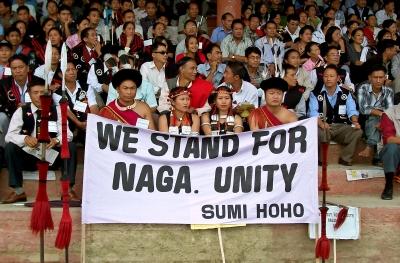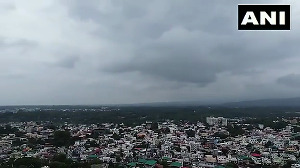A month has passed since the gruesome lynching in Dimapur.
'Societies like the Nagas have gone through so many decades of armed conflict. Conditions which are not 'normal' for others are 'normal' for them!'
'In such societies, there is always bound to be so much of pent-up feeling waiting to just come out. It just requires a little spark! And once the mob takes over, reason flies out the window,' says Naga author Charles Chasie.

"All sensible Nagas have condemned both the rape and the lynching," says Kohima-based writer-researcher Charles Chasie.
The inquiry about a rape accused being dragged out of prison and being lynched in the centre of Dimapur on March 5 has been handed over to the Central Bureau of Investigation.
"Many Nagas are in fact angry with the mob action because they (especially the Naga nationalistic elements) feel that such mindless action has exchanged Naga rights with the perpetrator's wrong," Chasie told Archana Masih/Rediff.com in an e-mail interview.
This was no ordinary anger because it brought out school and college children to be part of a murderous mob that brutally lynched a man. Was this anger solely because the alleged rapist was thought to be a Bangladeshi illegal?
This is an unfortunate practice in every agitation in Nagaland. The students are always mobilised to march in the streets, whether by students bodies or by mass-based organisations in the state. So, in this sense, students coming out is not unusual.
What other factors contributed to this rage that transformed this rally into a murderous mob?
Societies like the Nagas have gone through so many decades of armed conflict and violent situation. Such conditions which are not 'normal' for others are 'normal' for them!
In such societies, there is always bound to be so much pent-up feeling waiting to just come out. It just requires a little spark! And once the mob takes over, reason flies out the window.
We must also consider such a perspective and that, probably, desperation levels are rising all the time. But to discuss the situation will take more than a book!
Have you heard of a similar act of vigilante justice in Nagaland before? Do you think a mob would have done this if the accused was a Naga?
Would you agree the anger was more at the assumption that an 'Outsider' had defiled a Naga girl than at the crime itself?
Yes, there have been a few cases where the 'mob' have demanded instant justice and marched to the jail! These are also crimes committed by Nagas on Nagas. And in Kohima, the capital, too. But the authorities stood firm and controlled the situation.
The involvement of an 'outsider' may have contributed to unity among the mob involved, but I do not think this would have resulted in what it did if the authorities had taken timely action and stood firm.
There are always good and bad elements everywhere and Right and Wrong must be established in every single case independently, regardless of the individual's identity.
Has the important issue about rape and sexual violence in Nagaland been pushed to the back burner in the debate and din about the horrific lynching?
Certainly, the evolving situation may have overshadowed deeper issues temporarily. But all sensible Nagas have condemned both the rape and the lynching.
Many Nagas are in fact angry with the mob action because they (especially the Naga nationalistic elements) feel that such mindless action has exchanged Naga right with the perpetrator's wrong.
Why hasn't Naga society seen public outrage when there have been incidents of Naga men raping Naga women?
There have been such cases. Moreover, the Nagas have their own traditions about dealing with such cases. There have also been cases where the family and relatives of the victim have gone and taken revenge on the perpetrator/s.
What are the reasons behind the antipathy towards 'outsiders'? Is it because they have deprived the locals of jobs?
Please read a little more about the Naga political movement and what has taken place since it started. It is best is to read all, or as many as possible, and form your own opinion. Jobs and the economy may not be the primary reason/s in this case.
Is this antipathy more towards Bengali-speaking Muslims than towards Indians from other parts of the country?
I personally don't think such differentiation would have made a difference. Both will only be seen as 'Plainsmen' or 'Indians'! This is not being racist.
The fact is many Nagas still don't feel a sense of allegiance or belonging as part of India.
Although it has become rarer now, you may still find people asking you, 'Have you come from India?'!
As a Naga, how has this lynching affected you? Is this a blot on the image of Naga society?
Cutting across tribal lines it angers every sensible Naga. Diversity or Insider and Outsider is not the issue here. When we talk about Naga society you must also remember that the ramifications go much beyond Nagaland although state boundaries are there and cannot be ignored.
Is it a time for Naga society to introspect?
In my book, The Naga Imbroglio (published in 1999), I had said it is time for the Nagas to turn the searchlight inwards. Sadly, till date, I have had little reason to change this perspective.
Why do you think the State failed so miserably in containing the mob and saving the life of a man in custody on March 5?
Let us not generalise. While the State is blamed, it really boils down to a few officers. Three have been suspended and an inquiry is going on. New officers have been appointed and so far up to 54 from among the mob have been arrested. Everyone is supporting that they be punished.
I am sure when the inquiry report comes in, things will be much clearer including whether other elements were involved and the victim's own connections, secret or otherwise.
Photograph published for representational purposes only.










